

Conflict of interest. The presence of a conflict of interest is independent of the occurrence of impropriety.

Therefore, a conflict of interest can be discovered and voluntarily defused before any corruption occurs. A widely used definition is: "A conflict of interest is a set of circumstances that creates a risk that professional judgement or actions regarding a primary interest will be unduly influenced by a secondary interest.
"[1] Primary interest refers to the principal goals of the profession or activity, such as the protection of clients, the health of patients, the integrity of research, and the duties of public office. Secondary interest includes not only financial gain but also such motives as the desire for professional advancement and the wish to do favours for family and friends, but conflict of interest rules usually focus on financial relationships because they are relatively more objective, fungible, and quantifiable. How the UC Regents Spin Public Funds into Private Profit.
“As universities become glorified vocational schools for corporations they adopt values and operating techniques of the corporations they serve.” – Chris Hedges (Empire of Illusion, 2009) This piece has been republished by The Berkeley Daily Planet.

A version of it also ran in the Sacramento News & Review, Santa Cruz Weekly, North Bay Bohemian, and the SF Public Press. Analysis from California Watch, The Aggie, Huffington Post, KCSB Radio, SFBG, The Daily Nexus and more. The story has been nominated for a Project Censored Award and has won the SPJ Northern California Chapter's James Madison Freedom of Information Award for Journalism. It was also a finalist for an Investigative Reporters and Editors award.
The Investors’ Club: How the University of California Regents Spin Public Money into Private Profit. Category: Page One from The Berkeley Daily Planet. [EDITOR'S NOTE: This is the introductory section of an eight-part series sponsored by the Berkeley Daily Planet in cooperation with several other publications, organized by the spot.us non-profit organization.
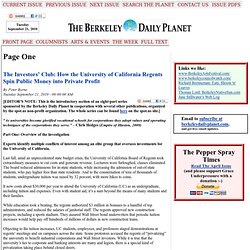
The whole series can be found here on the spot.us site.] “As universities become glorified vocational schools for corporations they adopt values and operating techniques of the corporations they serve.” – Chris Hedges (Empire of Illusion, 2009) Part One: Overview of the investigation Experts identify multiple conflicts of interest among an elite group that oversees investments for the University of California.
Last fall, amid an unprecedented state budget crisis, the University of California Board of Regents took extraordinary measures to cut costs and generate revenue. Lecturers were furloughed, classes eliminated. It now costs about $30,000 per year to attend the University of California (UC) as an undergraduate, including tuition and expenses. UC Regents and For-Profit Education. The UC regents are, how can we put this, totally corrupt.
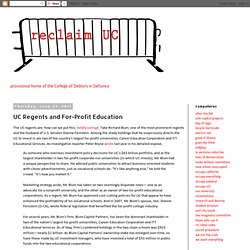
Take Richard Blum, one of the most prominent regents and the husband of U.S. Senator Dianne Feinstein. The Smell Test: How to tell the difference between a conflict of interest and a coincidence. The Regency. Most of the Regents of the University of California — whose very name gives you a good idea of the kind of power they wield over the direction and functioning of the University of California – are unelected, appointed to 12 year terms by the governor of California, and almost without exception, they have no real background or apparent interest in education.
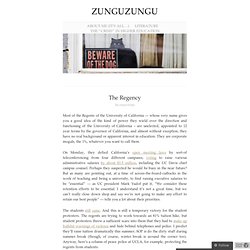
They are corporate moguls, the 1%, whatever you want to call them. On Monday, they defied California’s open meeting laws by sort-of teleconferencing from four different campuses, voting to raise various administrative salaries by about $3.5 million, including the UC Davis chief campus counsel. Perhaps they suspected he would be busy in the near future? But as many are pointing out, at a time of across-the-board-cutbacks in the work of teaching and being a university, to find raising executive salaries to be “essential” — as UC president Mark Yudof put it, “We consider these retention efforts to be essential. Pitch: Investor’s Club: How the UC Regents Spin Public Funds into Private Profit - Update: Part Four: Seven Private Equity Deals: How Regent Richard C. Blum benefited from $748 million worth of private equity and bond investments by UC. Regent Richard C. Blum. Image UfFI.
Problem loading page. The Case of Richard Blum. After Gerald Parsky ended his term as the head regent, Richard Blum took over this powerful position, and this change was important for many reasons.
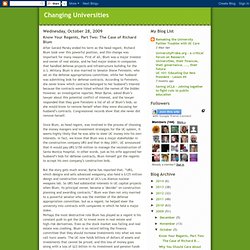
First of all, Blum was a major investor and owner of real estate, and he had major stakes in companies that handled defense projects and infrastructure building for the U.S. Military. Blum is also married to Senator Diane Feinstein, who sat on the defense appropriations committee, while her husband was submitting bids for defense contracts.
According to Feinstein, she never knew which contracts belonged to her husband’s interest because the contracts were listed without the names of the bidder. However, an investigative reporter, Peter Byrne, asked Blum’s lawyer about this potential conflict of interest, and the lawyer responded that they gave Feinstein a list of all of Blum’s bids, so she would know to remove herself when they were discussing her husband’s contracts. How to Find UC Assets:For latest report, click here, and go to Page 3: Know Your Regents, Part Two: The Case of Richard Blum. Conflict of interest. Blum Capital Home. Blum Capital. Blum Capital Partners (formerly Blum Capital) is an American private equity firm focused on leveraged buyout, growth capital and PIPE investments in small cap and middle-market companies across a range of industries.
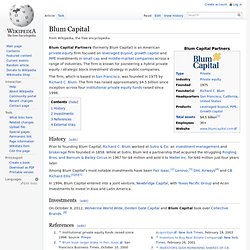
The firm is known for pioneering a hybrid private equity / strategic block investment strategy in public companies. The firm, which is based in San Francisco, was founded in 1975 by Richard C. Blum. The firm has raised approximately $4.5 billion since inception across four institutional private equity funds raised since 1998.
History[edit] Prior to founding Blum Capital, Richard C. Among Blum Capital's most notable investments have been Fair Isaac,[2] Lenovo,[3] DHL Airways[4] and CB Richard Ellis.[5][6][7] In 1994, Blum Capital entered into a joint venture, Newbridge Capital, with Texas Pacific Group and Acon Investments to invest in Asia and Latin America. Investments[edit] References[edit] External links[edit] The UCLA Blum Center on Poverty and Health in Latin America. The Blum Center Takeover Manifesto. The Blum Center Take-over group calls for: 1) UC Berkeley Chancellor Dirks to publicly renounce Janet Napolitano. 2) For all those in solidarity to cancel classes tomorrow (Friday, Feb 14), and for people to build a strike in support of Napolitano’s resignation and for the democratization of the University. 3) Full amnesty for all those reclaiming campus space, including those who have taken the Blum Center.
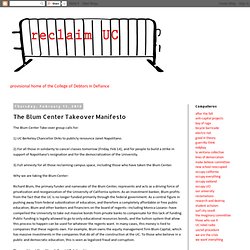
The Blum Center Takeover Manifesto. FreezePage. VirgieHoban : Students chaining themselves... Reclaimuc : #no2napolitano... Stilldiggin : Spotted at McCone #No2Napolitano... Studentactivism : Richard Blum, UC regent for...
Meet Sherry Lansing, the New Chair of the UC Regents. At the most recent UC Regents' meeting, which took place over the past two days, Sherry Lansing was elected to be the new chair of the board, replacing outgoing and two-time chair Russell Gould.
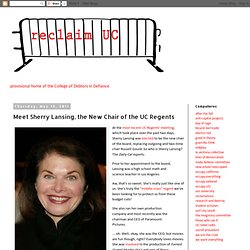
So who is Sherry Lansing? The Daily Cal reports: Prior to her appointment to the board, Lansing was a high school math and science teacher in Los Angeles. Aw, that's so sweet. University of Capital. Fact Sheet from #UCDavis Administration annotated by some skeptical faculty #OccupyUCDavis. Fact Sheet from #UCDavis Administration annotated by some skeptical faculty #OccupyUCDavis. UC Board of Regents cancels upcoming meeting. The UC Board of Regents has decided to cancel its meeting this week over fears for public safety, according to an announcement from the UC Office of the President.
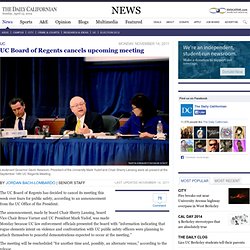
The announcement, made by board Chair Sherry Lansing, board Vice Chair Bruce Varner and UC President Mark Yudof, was made Monday because UC law enforcement officials presented the board with “information indicating that rogue elements intent on violence and confrontation with UC public safety officers were planning to attach themselves to peaceful demonstrations expected to occur at the meeting.” The meeting will be rescheduled “for another time and, possibly, an alternate venue,” according to the release.
Yudof to retire as president of U. of California. Mark G. Delegitimate UC. By Rei Terada [Audio version here] The moment we’re in right now is auspicious, fragile, and surprisingly well-defined. The thing that strikes me most about the moment is how much it is a particular moment, with specific characteristics and borders. It appears as the clearest-looking and most pregnant moment since students starting taking action in Fall 2009. It’s the moment we’ve hoped to attain since Fall 2009. And now that it’s here, it won’t last long. In Fall 2009, UC’s upper administration must have assumed that they could wait out the student movement.
Spray It Forward - The Daily Show with Jon Stewart - 11/28. UC Board of Regents' meeting disrupted by protests. SAN FRANCISCO — The UC Board of Regents’ meeting — held via teleconference at four campuses — came to a halt Monday morning when demonstrators overwhelmed board members by holding their own meetings in solidarity with the Occupy movement. Just as board members were beginning the open session of their meeting at 11:40 a.m., protesters initiated an impromptu human mic check at the San Francisco, Merced, Los Angeles and Davis campuses to form their own meetings. The protesters’ method of human amplification was disruptive enough to derail the meeting for over a half hour at each site — with the exception of UC Merced. “I’m sorry a small number of students decided to disrupt our meeting,” said board chair Sherry Lansing. “They could not hear what we had to say, and that saddens me.” The request for the increase comes in a year in which the university has already been cut $650 million and could face an additional $100 million reduction in state funding.
Lt. UC students, staff stage zombie protest at regents meeting. Four Case Studies in Conflicts of Interest by UC Regents. Why You Should Care About the UC Regents. The Regents are one of the most powerful groups of people in the UC system, but their activities and their priorities often remain hidden from public view. Political appointees serving 12-year terms, most of the regents are successful business people with no background in education. Their central role appears to be to ensure the financial health of the UC system. However, for the past nine years, they have done very poorly at this task. Reclamations - Current Issue. Issue 2 (April 2010) Who Rules the University? To What Ends Do They Rule? Newco: Universities Selling Out Important Research to Corporate Overseers. Photo Credit: Shutterstock.com/ isak55 June 27, 2013 | Like this article?
(pdf)AUTHORIZATION TO CREATE A SEPARATE 501(C)(3) NONPROFIT CORPORATION TO OVERSEE THE MANAGEMENT OF INTELLECTUAL PROPERTY AND I. Imgur: (pdf)AUTHORIZATION TO CREATE A SEPARATE 501(C)(3) NONPROFIT CORPORATION TO OVERSEE THE MANAGEMENT OF INTELLECTUAL PROPERT. Public Research for Private Gain. In a unanimous vote last month, the Regents of the University of California created a corporate entity that, if spread to all UC campuses as some regents envision, promises to further privatize scientific research produced by taxpayer-funded laboratories. The entity, named Newco for the time being, also would block a substantial amount of UC research from being accessible to the public, and could reap big profits for corporations and investors that have ties to the well-connected businesspeople who will manage it.
Cloudminder. UCLA Faculty Association: Listen to the Regents morning session of March 18, 2015. Reclaim UC sur Twitter : ""a proposal to float a 100-year bond to create a revolving fund which would in turn finance various capital projects on selected campuses"" Reclaim UC sur Twitter : "any thoughts, finance folks? obvs the century bond is significant, but also curious about this "revolving fund"… Andrew McGettigan sur Twitter : "@cnewf @reclaimuc @FrankPasquale UC's problem is short 'tenor' bonds that need regular rollover at a time when interest rates about to rise" Andrew McGettigan on Twitter: "@cnewf @reclaimuc @FrankPasquale the bond would create an artificial endowment fund. Question is: what size would it be?"
Andrew McGettigan on Twitter: "@cnewf @reclaimuc @FrankPasquale what is it likely to fund? how would those projects generate surpluses? etc. looks like last move open."